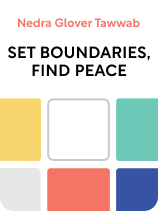

This article is an excerpt from the Shortform book guide to "Set Boundaries, Find Peace" by Nedra Glover Tawwab. Shortform has the world's best summaries and analyses of books you should be reading.
Like this article? Sign up for a free trial here.
What are personal boundaries? Why is it important to set boundaries in your relationships?
Your personal boundaries are your standards for how you’d like to be treated in your relationships. Setting healthy boundaries allows you to feel safe and comfortable in your relationships.
Therapist Nedra Glover Tawwab explains why setting personal boundaries is important and gives some examples of healthy and unhealthy boundaries.
Healthy Boundaries and Unhealthy Boundaries
What are personal boundaries, and why is it important to set them? When you set boundaries, you make sure that the people in your life know how you’d like to be treated, which can make things more comfortable both for them and for you. On the other hand, if you don’t set boundaries, you’ll likely experience resentment, anxiety, and exhaustion in your relationships. Without boundaries, your friends, coworkers, and loved ones will fail to live up to your standards, as they won’t know what those standards are in the first place. Inevitably, you’ll be frustrated and disappointed when these failures happen.
Boundaries can be explicit or implicit. For example, you might explicitly set a boundary with your roommate that you expect them to stay out of your room while you’re on work calls. By contrast, you might implicitly expect your roommate to not take money from your wallet without asking. As Tawwab notes, our tendency to be either explicit or implicit about our boundaries is shaped by our childhood relationships with our parents. If your parents had many unspoken rules and expectations, then you’ll tend to have implicit boundaries, whereas if your parents clearly expressed their rules, you’ll be more likely to have explicit boundaries.
(Shortform note: It’s especially important to understand your own explicit and implicit boundaries when it comes to sexual relationships. As experts note, when a sexual partner makes you feel uncomfortable, but hasn’t violated any of your explicit boundaries, it may be because they have violated an implicit boundary. When something like this happens, it’s important that you speak up to stop what’s happening and communicate your discomfort. If you’re feeling especially uncomfortable or unsafe, you may want to leave the situation entirely.)
(Shortform note: In addition to helping improve your relationships, setting boundaries can also have a positive impact on your health. According to mental health experts, setting boundaries is part of the process of self-care, which is an approach to wellness that stresses the ability of individuals to take charge of their own health and health care. Within the framework of self-care, learning how to set boundaries is a key strategy you can use to protect your mental and physical health.)
Your boundaries are informed by your personal history. Depending on your past relationships, you might develop boundaries differently. Tawwab specifies two types of unhealthy boundaries that people often develop: weak boundaries and strict boundaries (or as Tawwab refers to them, porous boundaries and rigid boundaries).
| Your Cultural Background Informs Your Boundaries One aspect of your personal history that shapes your boundaries is the culture you grow up in. For example, US culture emphasizes individual autonomy and success, which leads people to develop boundaries that protect their own individual needs and interests. By contrast, in cultures where the family is the fundamental unit of society, people tend to form boundaries that prioritize the needs of the family over the needs of the individual. While it isn’t inherently unhealthy to prioritize either yourself or your family, when taken to extremes either one of these paradigms can become unhealthy. For example, if you prioritize your own needs to such a degree that you shut others out, your boundaries may prevent you from forming close relationships. On the other hand, if you’re always putting others before yourself, your boundaries may stop you from pursuing your own goals and tending to your own needs. |
Tawwab’s first type of unhealthy boundary, weak boundaries, are boundaries that are too flexible to protect your needs. Weak boundaries make it hard to say no to people, even when you’re already feeling overwhelmed. Other signs you may have weak boundaries include a desire to make everyone happy, fear of rejection, and needing approval from others.
(Shortform note: In addition to failing to protect your needs, weak boundaries may also lead you to over-prioritize others’ needs. Experts note that people with weak boundaries choose to tend to others before dealing with their own problems. This can lead you to become increasingly withdrawn in your relationships, as other people’s needs continually boot yours offstage.)
For example, suppose you’d like one of your coworkers to contribute equally on shared projects, but you always end up covering for them as deadlines approach. While you’d rather not take on the extra work, you always agree to do it, out of a desire to help your coworker. In this scenario, you have a weak boundary with your coworker—because you’re unable to say no, you end up stretching yourself thin. As a result of the weak boundary, you overwork yourself, and you may even feel resentful toward your coworker.
If you weren’t allowed to prioritize your needs as a child, you may end up with weak boundaries as an adult. As Tawwab notes, this is especially common in adult children of parents who struggled with addiction.
(Shortform note: Tawwab’s belief that boundary issues often stem from childhood hardship reflects many of the ideas included in attachment theory. Attachment theory states that relationships in your formative years will affect the way you relate to others as an adult. For instance, if you’re constantly forced to put your needs aside as a child, you’ll likely form anxious attachments as an adult. If you’re an anxious attacher, you’re likely to engage in people-pleasing behavior, attempting to ensure other people’s needs are met while ignoring your own, in much the same way as Tawwab describes a person with weak boundaries behaving.)
Strict Boundaries
Strict boundaries are the second type of unhealthy boundary that Tawwab describes. Strict boundaries are the opposite of weak boundaries—they lead you to push people away in an attempt to keep yourself safe.
If you have strict boundaries, you might refuse to forgive friends for minor offenses and instead opt to cut them out completely. While cutting people out instead of working to set boundaries and resolve issues might keep those people from hurting you, setting such strict boundaries may lead you to lose friends and experience loneliness.
(Shortform note: In addition to cutting people out, you’ll tend to avoid conflict if you have strict boundaries. You’ll refuse to engage in difficult discussions, even when you need to advocate for yourself in your relationships. Keep in mind that while it’s natural to feel uncomfortable during conflict, productive conflict can also help individuals and relationships to grow.)
According to Tawwab, you might develop strict boundaries if others have taken advantage of you in the past. Strained relationships with family and friends who ask to borrow money, as well as a history of being taken advantage of in romantic relationships are common factors that can lead you to develop strict boundaries.
You may have strict boundaries if you experience fear of vulnerability, an inability to share, or you cut people out without first making an effort to repair the relationship.
(Shortform note: The characteristics and origins of strict boundaries are similar to the traits of someone with an avoidant attachment style. People who have avoidant attachment styles avoid forming intimate relationships. Much like people with strict boundaries, avoidant people tend to cut off relationships at the first sign of conflict. Experts believe that this tendency often stems from childhood experiences of neglect. Because of these experiences, avoidant people develop strict boundaries to prevent themselves from being harmed by neglectful behavior in adult relationships.)

———End of Preview———
Like what you just read? Read the rest of the world's best book summary and analysis of Nedra Glover Tawwab's "Set Boundaries, Find Peace" at Shortform.
Here's what you'll find in our full Set Boundaries, Find Peace summary:
- How to transform the relationships in your life with boundaries
- Why people struggle to reinforce their boundaries
- A step-by-step guide for identifying and communicating your boundaries






